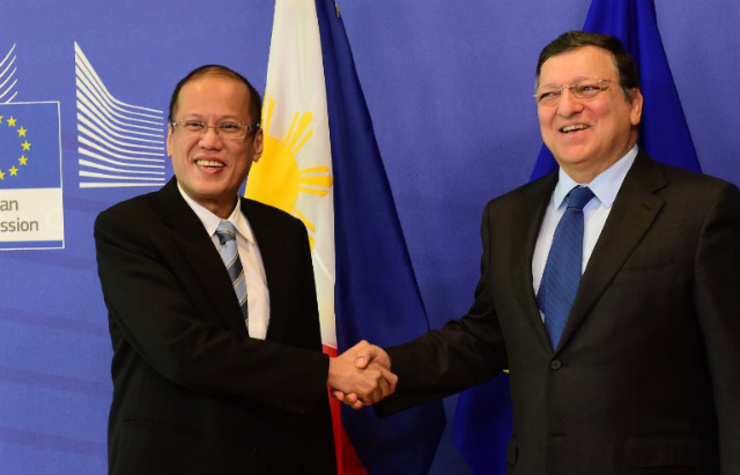The EU supports the Philippines’ bid for the resolution of its South China Sea dispute under UNCLOS, even as China rejects the 'internationalization' of the maritime row

UPHOLDING UNCLOS.
European Commission President Jose Manuel Barroso (right) greets Philippine
President Benigno Aquino III (left) at the European Commission in Brussels
Portraying a common stance likely to agitateChina Philippines China South
China Sea
China South
China Sea
Portraying a common stance likely to agitate
Philippine President Benigno Aquino III told European Commission President
José Manuel Barroso on Monday, September 15, that the Philippines South
China Sea
“Like the European Union, we believe that the only viable and effective
solution is one that is based on international law – and in particular, under
the United Nations Convention on the Law of the Sea or UNCLOS," Aquino
said in a statement at his joint press conference with Barroso at the European
Commission headquarters in Brussels, Belgium, after their bilateral meeting.
Aquino added: "This is the basis for the arbitral proceedings we
initiated last year. We also continue to work with ASEAN and with China South China Sea
For his part,
Barroso said at the news conference, “Let me stress that the European Union
encourages all parties to seek peaceful solutions, through dialogue and cooperation,
in accordance with international law – in particular with the UN Convention on
the Law of the Sea.”
He added that the
EU “is proud to be a party” of the Treaty of Amity and Cooperation, which aims
“to settle differences by peaceful means, to renounce the threat or use of
force, and to effectively cooperate among partners.”
Aquino is
visiting Europe for 8 days, at a cost of P31.9 million,
to boost trade and to seek
support for the Philippines China West
Philippine Sea
'Europe
“Europe supports
us in terms of peaceful resolution of China
Instead, it
insists on bilateral or one-on-one talks with the parties involved in the
dispute, instead of a multilateral or third-party approach.
International
bodies like the EU have not explicitly taken sides on the South
China Sea
The Philippines China South China Sea
To resolve this
dispute, the Southeast Asian country has filed an
arbitration case against China

No comments:
Post a Comment
Note: Only a member of this blog may post a comment.